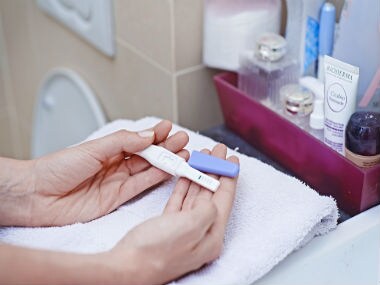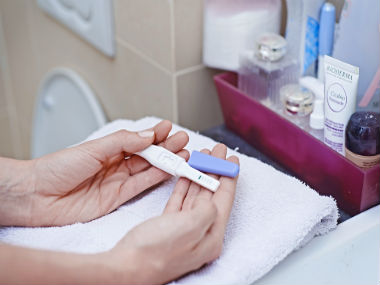“Girls are born with two million eggs - all the eggs they’ll ever need in their lives,” said Dr Shehnaz Zafar, a gynaecologist associated with myUpchar. “Yet, sometimes perfectly happy couples have difficulty conceiving. We can offer them fertility treatments that are tried and tested,” she added. Since they were introduced in 1967, fertility treatments and drugs have helped countless women give birth. However, just like every other pharmacological preparation, fertility drugs also have their own set of side-effects - the milder ones range from mood swings to bloating and breast tenderness, but there are some severe reactions also. [caption id=“attachment_7502761” align=“alignleft” width=“380”]  Representational image. Image source: Getty Images.[/caption] “One of them is ovarian hyperstimulation or OHSS,” said Dr Zafar. “It’s rare, but it can happen within the week after you get an HCG injection. One in 100 women who take hormone-based fertility treatments gets moderate to severe symptoms, but 33% get mild symptoms like bloating,” she added. This is how Dr Zafar explains this condition, which may become life-threatening in very severe cases:
Understanding fertility drugs
Most fertility drugs are made up of reproductive hormones that perform two major functions in the female body: first, they promote ovulation, and second, they help carry a pregnancy to its full term. Depending on the need, fertility drugs can either be given orally or through an injection. They are either given alone to promote fertility or as a part of in-vitro fertilisation (IVF) procedure. Ovarian hyperstimulation syndrome (OHSS) may occur as a side-effect of ovulation-inducing drugs.
In practice
Doctors may recommend various hormones to prepare the body for fertilisation. For example, follicle-stimulating hormone (FSH) is given to promote the maturation of ovarian follicles (which contain the eggs) before they are released in the uterus. Human chorionic gonadotropin (HCG) is given to promote the release of the mature ova - ovulation. Other hormones can help to carry the baby to term. However, an excess of hormones taken to promote ovulation — especially HCG — may send the ovaries into hyperdrive, so the ovaries swell up and start to release several eggs at a time. This swelling or enlargement of the ovaries can cause stomach ache, nausea and vomiting. The ovaries also start to produce various inflammatory compounds that increase the blood supply in the surrounding areas but weakens the permeability of the blood vessels. Meanwhile, the released follicles start to leak fluids, which can pass through the blood vessels and into the body cavity, causing ascites (fluid buildup) and bloating. Mild cases of OHSS are not at all life-threatening. But, in severe cases, the excess fluid release and inflammation associated with OHSS can affect the fluid and electrolyte balance of the body. This, in turn, can restrict kidney function, leading to reduced urination. As the fluid accumulates in the abdomen, it can start to put pressure on the lungs, making it difficult to breathe. Though rare, in severe cases, OHSS may result in pleural effusion (collection of fluids in the space around the lungs), kidney failure and cerebral oedema (swelling in the brain).
Who is at risk?
OHSS almost always happens as a side-effect of fertility drugs, though certain people are at a higher risk. These include women who have polycystic ovary syndrome (PCOS) or a history of mild OHSS. Young women — under 30 years of age — who take injectable fertility drugs are comparatively more susceptible to OHSS than women on fertility pills. “The chances of getting OHSS by taking fertility pills is much lower than if someone takes hormone injections - the difference is that when the drug is injected, it goes straight into the bloodstream,” explained Dr Zafar.
Diagnosis and treatment
OHSS is easily diagnosed through apparent symptoms. However, doctors usually recommend abdominal ultrasounds, liver and kidney function tests and blood tests to assess the situation. “Your doctor will advise a fertility treatment based on your body and your needs. They will also tell you how often they need to see you and what tests you need. It’s important that you don’t overlook any of this,” said Dr Zafar. Treatment for OHSS varies depending on the severity of the condition. “Most mild cases of OHSS subside on their own if the patient does not conceive within a week of the treatment,” explained Dr Zafar. “In some cases where it does not get better on its own, we have symptomatic and supportive treatments - we can remove any excess fluid from the stomach, we can balance the fluids and keep a close watch on the patient’s vitals in the ICU till they’re in the clear,” she added. In severe case, doctors may opt for surgery to reduce the swelling. “All in all, fertility treatments have come a long way since 1967 - when we first figured out how to enhance fertility with medicines," said Dr Zafar. “Of course, you should learn as much as you can about it before you sign up.” Health articles in Firstpost are written by myUpchar.com, India’s first and biggest resource for verified medical information. At myUpchar, researchers and journalists work with doctors to bring you information on all things health. For more information, read our article on Ovarian Hyperstimulation Syndrome_._


)

)
)
)
)
)
)
)
)



